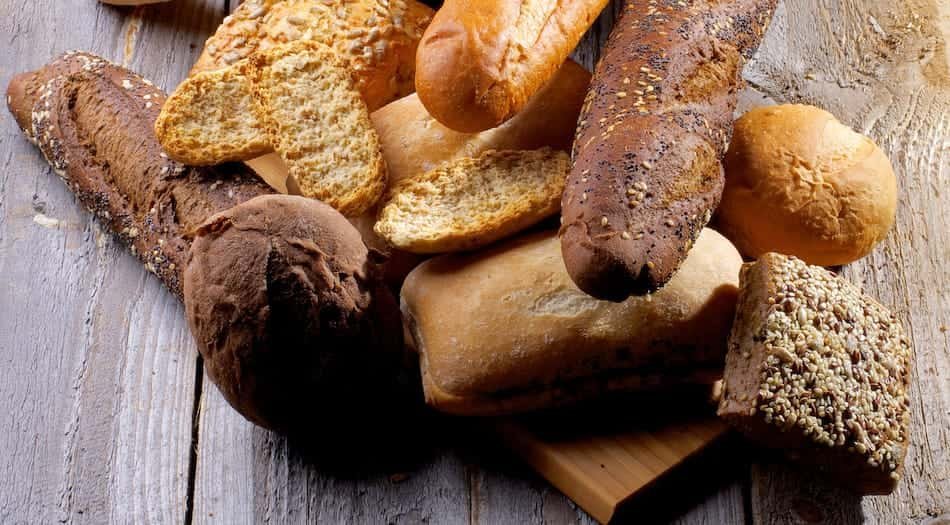Who can resist the smell of freshly baked bread? Or the taste of hot buttered toast? Our pups with their sensitive noses and tummies ever-ready for more snacking, aren’t exempt from the temptation either, but can dogs eat bread safely? The answer is yes and no. Dogs can eat bread in moderation only, and there are a lot of caveats. So read on to find out the pros and cons of letting your dog have bread.

Before introducing any new foods to your dog’s diet, always consult your vet. Individual dogs may have different intolerances, dietary needs, and health considerations. This article is not a substitute for professional veterinary advice.
Is Bread Safe For Dogs to Eat?
While bread is a staple for us humans which we regularly eat, from breakfast toast, to lunchtime sandwiches, to accompanying some main meals, it has potential risks for dogs. They lack the necessary enzymes to properly digest the carbohydrates found in bread, which can lead to stomach upset or worse. Most breads aren’t toxic to dogs, but care should be taken to check ingredients, and only give as small occasional treats.
Benefits Bread Can Have for Dogs
Some bread may offer some benefits for dogs, and the nutritional content of bread varies depending on the type. It’s also important to note that not all types of bread are safe for dogs, especially as some may contain ingredients toxic to dogs. Whole grain breads can be healthier choices for dogs as they contain more fiber and nutrients compared to white bread. Bread is best given occasionally rather than as a staple in your dog’s diet.
Source of Carbohydrates for Energy
Carbohydrates play an important role in a dog’s diet as they are the primary source of energy. Wheat, a main ingredient in most breads, contains complex carbohydrates that are slowly digested, providing a sustained release of energy throughout the day, helping to maintain vitality and activity levels. It also aids in supporting their cognitive functions and muscle endurance, making it an essential nutrient for their well-being. However there are better sources of carbohydrates for your dog other than bread, such as natural foods like some vegetables and fruit.
Contains Some Nutrients
Dogs can derive nutritional benefits from consuming whole grain bread, which offers a good source of fiber that can help maintain a healthy digestive system, promoting good bowel movements and aiding in nutrient absorption.

Risks to Dogs
There are a number of risks to dogs eating bread, including some sever ones.
Toxicosis Risks
One of the main concerns with dogs indulging in bread is the presence of yeast. They lack the necessary enzymes to properly digest it, leading to gastrointestinal issues and potential poisoning and toxicosis. Toxicosis is the fermentation of yeast especially in raw dough which produces ethanol (alcohol), and can cause alcohol poisoning in dogs.
Upset Stomach Symptoms
Additional flavoring in bread may upset dog stomachs. For example garlic, which is known to be harmful to dogs as it contains compounds that can disrupt their digestive system, leading to issues such as vomiting, diarrhea, lethargy and abdominal pain. Other common components that can upset a dog’s stomach include onions, raisins, and xylitol, all of which should be avoided.
Can Lead to Obesity
Feeding your dog bread regularly can contribute to obesity due to its calorie content leading to potential weight issues. They require a balanced diet to maintain a healthy weight and overall well-being, so it’s important to monitor their food intake carefully.
Gluten Intolerance
Although relatively rare, some dogs can be gluten Intolerant, which manifests in a similar way to celiac disease in humans, where the ingestion of gluten (a protein found in wheat, barley, and rye) leads to an adverse reaction including chronic diarrhea, vomiting, itchy skin, weight loss, lethargy.
What Types of Bread Should Dogs Avoid?
Certain types of bread are particularly harmful to dogs and should be avoided completely, such as those containing toxic ingredients like xylitol or seeds.
Xylitol is a common sweetener in many bread products, which can lead to a rapid drop in blood sugar levels in dogs, causing hypoglycemia and potential liver damage.
Certain seeds found in bread, like poppy seeds, can be toxic to the dog stomach, leading to symptoms like vomiting, diarrhea, and in severe cases, respiratory distress.
Bread-based products containing certain nuts, raisins, chocolate, onion, and other non dog friendly foods should be avoided.

FAQs
In this section, we address common questions related to dogs eating bread and the nutritional value of different types of bread.
Can Dogs Eat White Bread?
White bread is generally safe for dogs in moderation, as it provides carbohydrates without any added ingredients that may be harmful.
Can Dogs Eat Wholewheat Bread?
Wholewheat bread is generally a healthier option for dogs due to its fiber content and potential health benefits when consumed in moderation. Fiber is an essential component of a dog’s diet as it aids in digestion, maintains gut health, and promotes good bowel movements. With wholewheat bread being a good source of fiber, it can help prevent constipation and regulate blood sugar levels for furry friends. The nutritional benefits of wholewheat bread such as vitamins, minerals, and antioxidants support overall well-being. Remember however that moderation is key when feeding your dog bread, to avoid health issues or weight gain.
Can Dogs Eat Whole Grain Bread?
Whole grain bread provides additional nutrients for dogs and support healthy digestion when included as part of a balanced diet. It is a rich source of fiber, vitamins, and minerals, essential for your furry friend’s overall well-being. The fiber content helps regulate bowel movements, aiding in healthy digestion. Whole grains contain antioxidants that can boost your dog’s immune system.
Can Dogs Eat Sourdough Bread?
Sourdough bread can be safe for dogs. The fermentation process involves the breakdown of gluten and phytic acid, making it easier for digestion, which could be beneficial for dogs with sensitive stomachs.
Can Dogs Eat Toast?
Feeding dogs plain white, wholemeal or wholegrain toast in moderation can be acceptable, but it’s essential to limit the quantity and monitor their overall intake of human foods.
Can Dogs Eat Bread Crusts?
While dogs can certainly enjoy the occasional crust as a tasty snack, excessive consumption can lead to weight gain and potential digestive issues due to the carbohydrates and high calorific content. Moderation is key and a happy and healthy pup is the ultimate goal!
Can Dogs Eat Raw Bread Dough?
Dogs should not eat raw bread dough, as it can lead to severe health problems, including bloating and the risks of toxixosis and xylitol toxicity. Bread dough poses a serious risk to dogs due to fermentation in their stomach, causing it to expand rapidly. This can lead to bloating, which may result in gastric torsion, a life-threatening condition. The raw bread dough of yeast-based bread may cause ethanol poisoning. The ethanol produced in their digestive system can result in vomiting, diarrhea, bloating, and even potential organ damage. Ethanol, a byproduct of yeast fermentation, is rapidly absorbed into a dog’s bloodstream, affecting their central nervous system and leading to alcohol poisoning. This can be particularly dangerous for canines due to their sensitivity to alcohol.
Can Dogs Eat Bread and Butter?
Dogs can occasionally have small amounts of plain bread and butter. Avoid excessive consumption due to the risk of obesity and other potential health issues. Be sure to check the ingredients list because some commercial butter brands contain xylitol, a sweetener that is toxic to dogs.
Can Dogs Eat Bread Sticks?
Some common ingredients in bread sticks, such as garlic and onion, can be harmful to dogs, leading to digestive issues, lethargy, and even more severe complications. The high fat content in some bread sticks can also cause digestive problems and health issues.
Can Dogs Eat Garlic Bread?
Garlic bread should be strictly avoided for dogs due to its toxic effects. Even a small amount of garlic can cause poisoning in dogs, leading to vomiting, diarrhea, and weakness.
Can Dogs Eat Banana Bread?
Banana bread is generally a safer option for dogs compared to other breads, providing there is no additional sugar added. Bananas bring numerous health benefits due to the vitamin and minerals. They are a good source of potassium, fiber, and essential vitamins, aiding in digestion and overall well-being. However excessive consumption can lead to digestive problems such as constipation, so make it an occasional treat only.
Does Bread Help A Dog With an Upset Stomach?
Feeding bread to a dog can sometimes help in binding irritants which might be causing the digestive issues, or absorbing excess stomach acid. However it’s important to be aware that some types of bread, such as those high in fiber or containing ingredients like raisins, onions, or garlic, can be harmful to dogs. Before giving any human food to a pet, including bread, it’s always best to seek advice from a qualified professional to ensure the safety and health of your furry companion.
Final Thoughts on Can Dogs Eat Bread?
Can dogs eat bread? Yes, bread can be an occasional treat for dogs in moderation but it’s important to understand the risks. Opt for plain, whole grain varieties without any harmful additives. Some ingredients can be toxic to dogs, such as xylitol, raisins, garlic, onion, and others in bread-based snacks. Always consult with your veterinarian for advice if you are at all unsure, for the top dog care possible.





